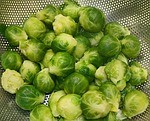Children Prefer to Eat Flavor Paired Vegetables

Is junior not eating his brussels sprouts? I don't blame him, but according to new research, that may just mean I wasn't exposed to flavor paired vegetables when I was younger.
According to a study published in The Journal of the Academy of Nutrition and Dietetics, kids are more likely to develop a liking for bitter veggies if they are paired with something sweeter when first introduced.
In the study, researchers tested the tastes of 29 children ranging from three to five years of age. One test group was presented with brussels sprouts, a particularly bitter vegetable, paired with sweetened cream cheese. A second group was given the same vegetable with unsweetened cream cheese. The two groups were also presented with cauliflower, a non-bitter vegetable. The first group received cauliflower with unsweetened cream cheese and the second group received the opposite. Lastly, a third group of children were presented with both vegetables paired with no cream cheese at all. After tasting, the children were asked to indicate their liking of the vegetable to the researchers. These groups were presented the same pairing for several days, but by the 15th day of trials, all children were presented with the vegetables alone.
Interestingly, by the end of the trials, a clear pattern was seen. Children who received the bitter brussels spouts with sweetened cream cheese on day one were far more likely to enjoy the vegetable alone by day 15, compared to the children from the other groups. Results for the cauliflower were less obvious, indicating that flavor pairings with non-bitter more-familiar vegetables are not nearly as effective in cultivating a liking for that food.
So what does this mean? Encouraging healthy balanced meals in kids might be something as simple as squeezing a little ketchup on that spinach the first few times the child tries it, even if you serve the vegetable plainly later on. Flavor pairing may become a handy weapon in a parent's arsenal.
The study was published by The Journal of the Academy of Nutrition and Dietetics on January 21.
Feb 07, 2014 01:47 PM EST




